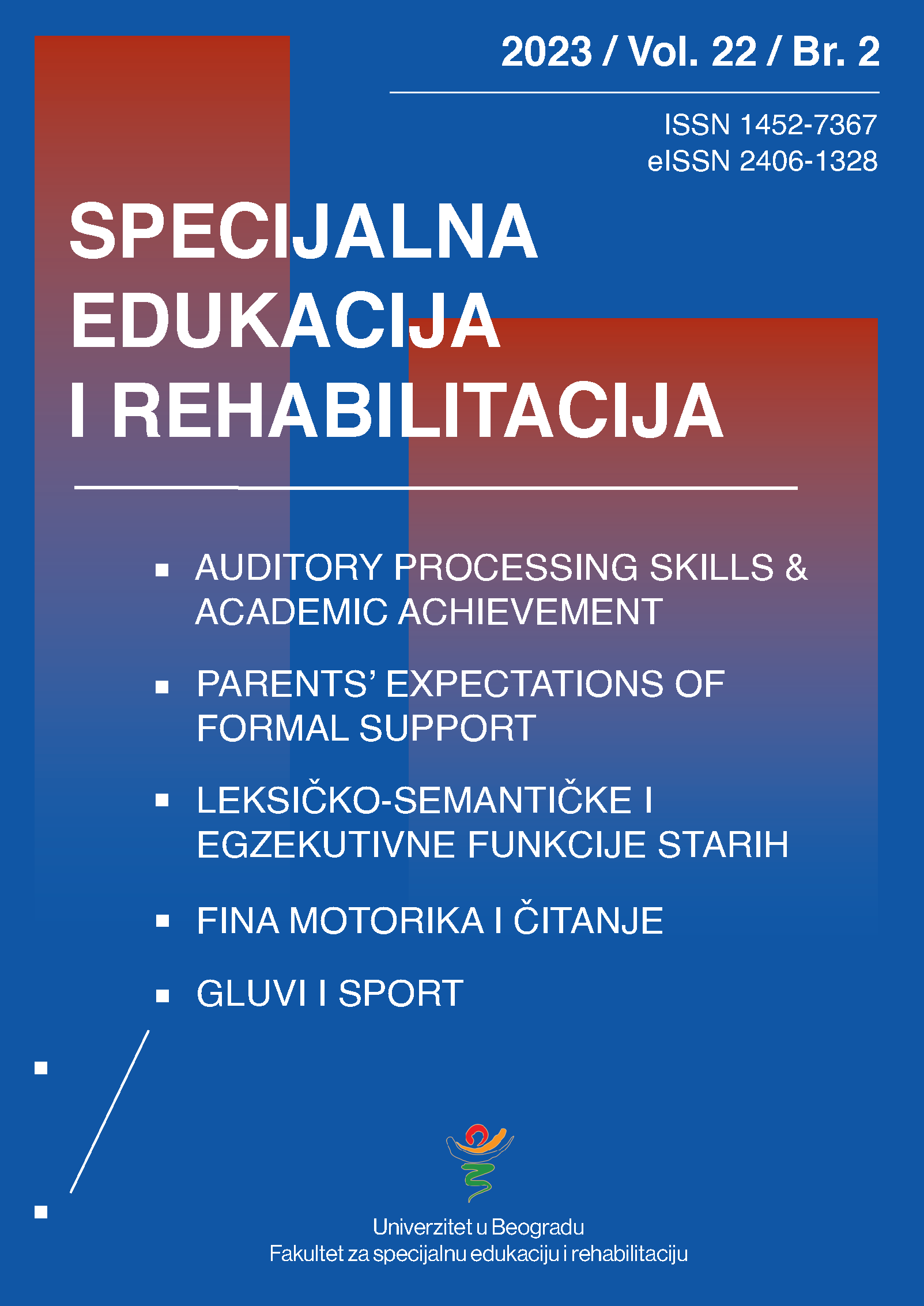Lexical-semantic abilities and executive functions in the elderly
Abstract
Lexical-semantic abilities and executive functions in the elderly
Introduction. The development of modern society has led to an increase in the life expectancy, and thus to a significant increase in the number of elderly people. Therefore, in recent years a lot of attention has been paid to the examination of cognitive abilities in this population. The research focuses on changes in language, executive functions and memory. Aim. This study aimed to determine lexical-semantic abilities and executive functions in persons over the age of 65. Methods. The sample included 30 people ranging in age from 66 to 85. The respondents were divided into two age categories, with 16 respondents from the "young old" category and 14 respondents in the "middle-old and oldest-old" category. The sample included 13 respondents who had finished elementary school and 17 respondents who had finished secondary or higher/university education. The Semantic Test and the Verbal Fluency Test were used to assess lexical-semantic abilities. To assess executive functions, the Stroop test was used. Results. The results have shown that respondents with different age categories do not differ in their achievements on tests for the assessment of lexical-semantic abilities. However, differences in achievements were determined in relation to the level of education of the respondents. People with a higher educational level were more successful on the mentioned tests. Furthermore, the results show a difference in achievement on the test for assessing executive functions based on age and level of education. Conclusion. These findings indicate that executive functions are more sensitive to age than lexical-semantic abilities.
References
Baghel, M. S., Singh, P., Srivas, S., & Thakur, M. K. (2019). Cognitive changes with aging. Proceedings of the National Academy of Sciences, India Section B: Biological Sciences, 89(3), 765-773. https://doi.org/10.1007/s40011-017-0906-4
Birmančević, J. (2021). Odgovori na izazove i prilike globalnog trenda starenja populacije. Gerontologija, 49(2), 11-30.
Caramazza, A., & Hillis, A. E. (1990). Where do semantic errors come from?. Cortex; A Journal Devoted to the Study of the Nervous System and Behavior, 26(1), 95-122. https://doi.org/10.1016/s0010-9452(13)80077-9
Christensen, H. (2001). What Cognitive Changes can be Expected with Normal Ageing? Australian and New Zeeland Journal of Psychiatry, 25(6), 768-775.
https://doi.org/10.1046/j.1440-1614.2001.00966.x
Dragićević, R. (2010). Leksikologija srpskog jezika. Zavod za udžbenike.
Elgamal, S. A., Roy, E. A., & Sharratt, M. T. (2011). Age and verbal fluency: the mediating effect of speed of processing. Canadian Geriatrics Journal: CGJ, 14(3), 66-72. https://doi.org/10.5770/cgj.v14i3.17
Gligorović, M., Buha, N., Dučić, B., Banković, S., Đurić Zdravković, A., i Maćešić Petrović, D. (2015). Oligofrenološka procena. U M. Gligorović (Ur.), Protokol za procenu edukativnih potencijala dece sa smetnjama u razvoju (str. 114–225). Univerzitet u Beogradu – Fakultet za specijalnu edukaciju i rehabilitaciju.
Gordon, J, K., Young, M., & Garcia, C. (2018). Why do older adults have difficulty with semantic fluency? Neuropsychology, Development, and Cognition, Section B, Aging, Neuropsychology and Cognition, 25(6), 803-828. https://doi.org/10.1080/13825585.2017. 1374328
Higby, E., Cahana-Amitay, D., Vogel-Eyny, A., Spiro III, A., & Albert, M., (2019). The Role of Executive Functions in Object - and Action-Naming among Older Adults. An International Journal Devoted to the Scientific Study of the Aging Process, 45(4), 306-330. https://doi.org/10.1080/0361073X.2019.1627492
Каrper, Dž. (2004). Čudesni mozak. Naučna knjiga.
Kircher, T., Nagels, A., Kirner-Veselinovic, A., & Krach, S. (2011). Neural correlates of rhyming vs. lexical and semantic fluency. Brain Research, 1391, 71-80. https://doi.org/10.1016/j.brainres.2011.03.054>
Lalović, D., i Jovović, Ј. (2013). Verbalna fluentnost i mogućnost njene primene u proceni јezičkih sposobnosti starijih lica. Andragoške studije, 2, 121–136.
Pino Escobar, G., Kalashnikova, M., & Escudero, P. (2018). Vocabulary matters! The relationship between verbal fluency and measures of inhibitory control in monolingual and bilingual children. Journal of Experimental Child Psychology, 170, 177-189. https://doi.org/10.1016/j.jecp.2018.01.012>
Shafto, M. A., & Tyler, L. K. (2014). Language in the aging brain: the network dynamics of cognitive decline and preservation. Science (New York, N.Y.), 346(6209), 583-587. https://doi.org/10.1126/science.1254404>
Shao, Z., Janse, E., Visser, K., & Meyer, A. (2014). What do verbal fluency tasks measure? Predictors of verbal fluency performance in older adults. Frontiers in Psychology, 5, 772. https://doi.org/10.3389/fpsyg.2014.00772
Shishkin, E., & Ecke, P. (2018). Language dominance, verbal fluency, and language control in two groups of Russian-English bilinguals. Languages, 3(3), 27. https://doi.org/10.3390/languages3030027>
Schneider, B. A. Daneman, M., & Pichora-Fuller, M. K. (2002). Listening in aging adults: From discourse comprehension to psychoacoustics. Canadian Journal of Experimental Psychology, 56(3), 139-52. https://doi: 10.1037/h0087392
Soares, E. C. S., & Ortiz, K. Z. (2009). Influence of schooling on language abilities of adults without linguistic disorders. Sao Paulo Medical Journal, 127(3), 134-139.
Stošljević, М. (2015). Osnovi specijalne еdukacije i rehabilitacije osoba sa motoričkim poremećajima (Drugo izdanje). Univerzitet u Beogradu – Fakultet za specijalnu edukaciju i rehabilitaciju.
Vladisavljević, S. (1983). Semantički test. U Đ. Kostić, S. Vladisavljević i M. Popović (Ur.), Testovi za ispitivanje govora i jezika (str. 179–189). Zavod za udžbenike i nastavna sredstva.
Vuković, M. (2012). Poremećaji komunikacije kod traumatskih oštećenja mozga. Univerzitet u Beogradu – Fakultet za specijalnu edukaciju i rehabilitaciju.
Vuković, М. (2016). Afaziologija (Četvrto dopunjeno izdanje). Udruženje logopeda Srbije.
Vuković, М. (2019a). Neurodegenerativni poremećaji govora i jezika. Univerzitet u Beogradu – Fakultet za specijalnu edukaciju i rehabilitaciju.
Vuković, М. (2019b). Afaziologija (Peto izdanje). Planeta print.
Vuković, M., i Jerkić, L. (2021). Morfosintaksičke sposobnosti kod starih ljudi. U B. Jablan (Ur.): Zbornik radova 11. Međunarodnog skupa „Specijalna edukacija i rehabilitacija danas” (str. 313–320). Univerzitet u Beogradu – Fakultet za specijalnu edukaciju i rehabilitaciju.
Whiteside, D. M., Kealey, T., Semla, M., Luu, H., Rice, L., Basso, M. R., & Roper, B. (2016). Verbal fluency: language or executive function measure? Applied Neuropsychology: Adult, 23(1), 29-34. https://doi.org/10.1080/23279095.2015.1004574
Welch, L. W., Doineau, D., Johnson, S., & King, D. (1996). Educational and gender normative data for the Boston Naming Test in a group of older adults. Brain and Language, 53(2), 260–266. https://doi.org/10.1006/brln.1996.0047
Zelinski, E., Dalton, S., & Hindin, S. (2011). Cognitive changes in healthy older adults. Generations, 35(2), 13-20. https://www.jstor.org/stable/26555770>
Copyright (c) 2023 Specijalna edukacija i rehabilitacija

This work is licensed under a Creative Commons Attribution-ShareAlike 4.0 International License.

